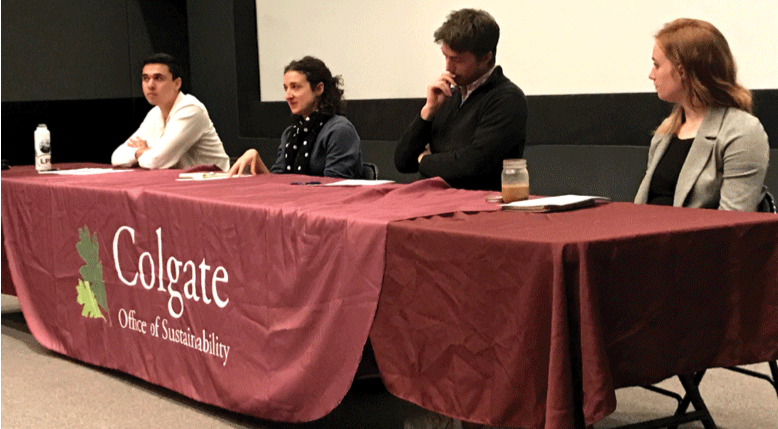Colgate Celebrates 13 Days of Green
At the Green Summit Lecture, panel members talked about the different impacts of climate change. They alsodiscussed the problems and solutions surrounding this issue.
Colgate kicked off its annual celebration of the days leading up to Earth Day on Tuesday, April 10. The “13 Days of Green” are meant to motivate the Colgate community to be as sustainable as possible and includes many events that aim to educate as well as entertain. Events included a pop-up thrift shop in the Hall of Presidents, as well as a Trivia Night hosted by the Beekeeping Club.
This past week, Colgate celebrated the “13 Days of Green” with a student activism panel, the Green Summit and Oak Awards and an Environment Studies (ENST) Brown Bag.
The Green Summit and Oak Awards, one of the “13 Days of Green” events, addressed different perspectives and effects of climate change. On Thursday, April 12, professors and students from across different departments came together in Golden Auditorium and aimed to “look from beyond an environmental perspective,” according to Colgate Calendar Events. The panel members explained the various impacts that different disciplines may focus on when discussing climate change, environmental economics and activism. Questions ranging from concerns of climate change to the modern disconnect between scientists and the average American were met with perspectives rooted in peace and conflict studies, sociology, economics and biology, ultimately allowing the attendees to take more from the Green Summit than a traditional lecture. It included multi-faceted explanations of problems that modern society suffers from, and possible solutions.
First-year Reagan Ferris Whittle attended the Green Summit.
“It’s very interesting how so many different concentrations are affected by something once perceived as purely environmental. You start to see aspects you didn’t really consider at first–the panel was definitely well-rounded with all these different interests,” Ferris said.
The ENST Brown Bag led by Assistant Professor of Economics Isla Globus-Harris was held in the African, Latin, Asian and Native Amerian (ALANA) Cultural Center on Friday, April 13. The presentation mainly focused on what Globus-Harris dubbed “free-riding,” which occurs when those who benefit from resources or services do not pay for them. In terms of energy subsidy programs, however, the term takes a slightly different meaning; households may upgrade their appliances for the sake of receiving a subsidy instead of contributing to environmental benefits. Overall, free-riders use a program’s budget while not aiding the cause, ultimately under-provisioning the program itself.
Globus-Harris offered tactics to combat free-riding.
“We can design a program free-riders don’t want to use by placing waiting periods–something along the lines of showing the program your new air conditioner’s receipt after a six-month period,” Globus-Harris said.
This methodology removes the instant gratification of a subsidy for free-riders, yet still allows the target demographic to help the environment. The downside is that the benefits of the program in question would occur much later.
First-year Miranda Smith was interested in Globus-Harris’ presentation and was shocked to discover that roughly 31 percent of the program’s beneficiaries that Globus-Harris investigated were free-riders.
“The fact of the matter is people need to understand that what we’re doing to the environment is a real problem–that money shouldn’t be a motivator,” Smith said.
Colgate’s 13 Days of Green will continue through April 22, with many more events to come. Events can be found on the Colgate Calendar.
Contact Miller Downer at [email protected].
Miller Downer is a senior from Natchez, Mississippi concentrating in environmental biology and English. He's previously served as an assistant commentary...







